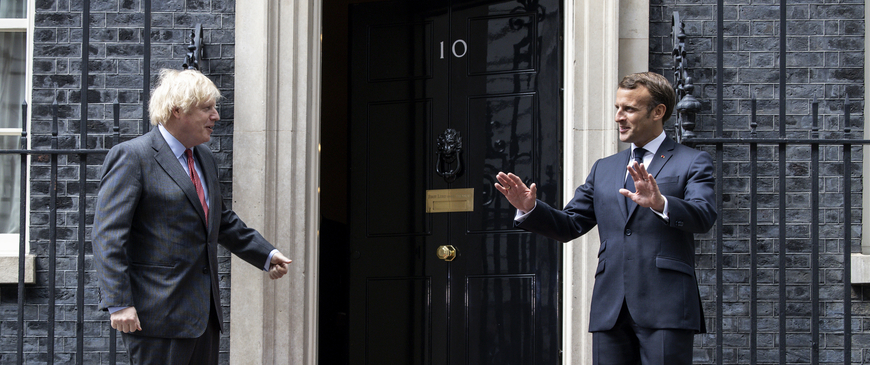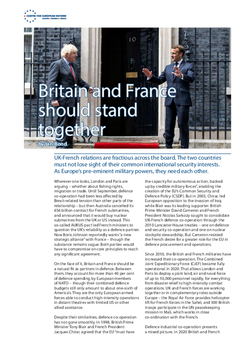
Britain and France should stand together
UK-French relations are fractious across the board. The two countries must not lose sight of their common international security interests. As Europe’s pre-eminent military powers, they need each other.
Wherever one looks, London and Paris are arguing – whether about fishing rights, migration or trade. Until September, defence co-operation had been less affected by Brexit-related tension than other parts of the relationship – but then Australia cancelled its €56 billion contract for French submarines, and announced that it would buy nuclear submarines from the UK or US instead. This so-called AUKUS pact led French ministers to question the UK’s reliability as a defence partner. Now Boris Johnson reportedly wants “a new strategic alliance” with France – though the substance remains vague. Both parties would have to compromise on core principles to reach any significant agreement.
On the face of it, Britain and France should be a natural fit as partners in defence. Between them, they account for more than 40 per cent of defence spending by European members of NATO.
On the face of it, Britain and France should be a natural fit as partners in defence. Between them, they account for more than 40 per cent of defence spending by European members of NATO – though their combined defence budgets still only amount to about one-sixth of America’s. They are the only European armed forces able to conduct high-intensity operations in distant theatres with limited US or other allied assistance.
Despite their similarities, defence co-operation has not gone smoothly. In 1998, British Prime Minister Tony Blair and French President Jacques Chirac agreed that the EU “must have the capacity for autonomous action, backed up by credible military forces”, enabling the creation of the EU’s Common Security and Defence Policy (CSDP). But in 2003, Chirac led European opposition to the invasion of Iraq while Blair was its leading supporter. British Prime Minister David Cameron and French President Nicolas Sarkozy sought to consolidate UK-French defence co-operation through the 2010 Lancaster House treaties – one on defence and security co-operation and one on nuclear stockpile stewardship. But Cameron resisted the French desire for a greater role for the EU in defence procurement and operations.
Since 2010, the British and French militaries have increased their co-operation. The Combined Joint Expeditionary Force (CJEF) became fully operational in 2020. That allows London and Paris to deploy a joint land, air and naval force of up to 10,000 personnel rapidly, for everything from disaster relief to high-intensity combat operations. UK and French forces are working together or in complementary roles outside Europe – the Royal Air Force provides helicopter lift for French forces in the Sahel, and 300 British troops participate in the UN peacekeeping mission in Mali, which works in close co-ordination with the French.
Defence industrial co-operation presents a mixed picture. In 2020 British and French defence ministers announced a contract to produce a common autonomous maritime mine countermeasures system – intended to replace the existing mine countermeasures vessels of the two sides. The European missile company MBDA (whose largest shareholders are BAE Systems and Airbus, with the Italian-UK firm Leonardo holding a smaller stake) is working on a number of joint missile projects for UK and French forces, replacing previous national systems. On the negative side, two armed drone projects were abandoned, and the UK and France are backing rival projects for next-generation combat aircraft – the UK working with Sweden and Italy, and France with Germany and Spain.
The UK and France are also Europe’s nuclear powers. They share some research facilities that help to ensure that their nuclear weapons remain safe and effective. London and Paris are both lobbying to ensure that the 2022 US nuclear posture review does not rule out the US responding to a non-nuclear attack with nuclear weapons. A new US policy on these lines could lead an adversary to think that a conventional attack would never give rise to a nuclear response, thus undermining the deterrent effect of US nuclear forces. It could also put political pressure on the UK and France to copy the US decision.
For all the areas of agreement, however, London and Paris are deeply divided over the roles of the EU and NATO in European security. The UK’s post-Brexit absence from EU discussions has widened the gap. France has taken Brexit as an opportunity to promote Macron’s ideas for European strategic autonomy. Though the concept now stretches to avoiding excessive supply-chain dependence on China (and others, including the US), France’s original focus was on enabling Europeans to carry out military operations without having to rely on US support. This required a more prominent EU role in some areas of security, including capability development.
As the US focuses increasingly on countering China’s rise, Europe is right to take more responsibility for maintaining its own security. In the joint statement that Biden and Macron issued following a telephone call designed to clear the air after the AUKUS row, the US recognised “the importance of a stronger and more capable European defence, that contributes positively to transatlantic and global security and is complementary to NATO”. France has emphasised the European aspect, however, and downplayed the issue of complementarity. France is keen that NATO’s new strategic concept – the guiding document for alliance strategy and plans – which will be adopted in 2022, explicitly endorses an increased EU role in European defence, but Paris is resisting efforts to increase EU-NATO co-ordination in defence capability development. France also opposes broadening the scope of NATO activity to reflect new challenges, whether from China or emerging and disruptive technologies. Macron, who in 2019 described NATO as “brain dead”, has moderated his language, but does not seem enthusiastic about revitalising NATO.
Macron, who in 2019 described NATO as “brain dead”, has moderated his language, but does not seem enthusiastic about revitalising NATO. He needs to admit that NATO will do some things better than the EU for the foreseeable future.
The UK has the opposite problem: it refuses to accept that the EU plays a significant role in European security and is becoming a defence actor in its own right. Though Theresa May had sought an agreement with the EU on foreign, security and defence co-operation as part of the EU-UK Brexit deal, Boris Johnson rejected the idea. 'Global Britain in a competitive age’, the government’s March 2021 review of security, defence, development and foreign policy, is almost entirely silent on the potential contribution of the EU to European defence and security, apart from a reference to the UK supporting closer practical co-operation between the Union and NATO. A recent article by Foreign Secretary Liz Truss on Belarus did not refer once to the role of the EU in tackling the crisis there.
Both France and the UK need to take their ideological blinkers off. Macron needs to admit that NATO will do some things better than the EU for the foreseeable future, and accept that many of the EU member-states that take defence most seriously (especially those in Central Europe and the Nordic/Baltic region) support an expanded role for NATO. Johnson should stop pretending that there is no area of European foreign, security or defence policy where the EU’s institutions can add value to what individual member-states or NATO are doing. If Canada, Norway and the US are willing to participate in an EU project to facilitate the movement of military forces around Europe, for example, why is the UK still ignoring it?
For a strategic alliance to be a realistic ambition, both leaders need to rebuild mutual trust and put aside the short-term political incentives to fuel bilateral tensions. Johnson’s popularity with his pro-Brexit supporters benefits from picking fights with France; Macron’s electoral chances against eurosceptic rivals improve if Brexit is seen to harm the UK. But Europe is under threat from Russian revanchism in the east, violent extremism and regional conflicts in the south and the rise of China’s authoritarian model of governance globally. France and the UK should not respond by squabbling about fishing licences and migrants in rubber dinghies.
Ian Bond is director of foreign policy at the CER.

